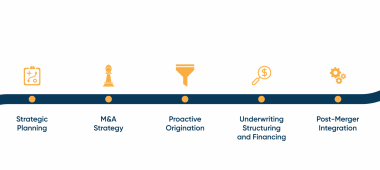Generational transitions require capital and a renewed commitment to the business. They can force difficult decisions, including whether to sell, although other alternatives may be superior. Many owners dream of keeping their business within the family for generations, yet this becomes increasingly difficult over time. Ownership stakes become dispersed among family members whose priorities are heavily influenced by their age and involvement in the business. Older members approaching retirement typically prefer high dividends, while the younger generation might want to reinvest for long-term growth. Family members can end up feeling stuck because the bulk of their net worth is tied to the business and they have no way to monetize their equity stake.
In the face of such complexities, the goal of keeping the business in the family is sometimes abandoned for an outright sale. In some cases, the family may not be aware of other available alternatives. Fortunately for families and their businesses, there are many nuanced options beyond the binary decision of whether to sell or not. Each solution has its own advantages and disadvantages, as explained below.
Outright sale
By selling the business, the family avoids the complicated task of transitioning to the subsequent generation, with its increasingly diverse wants, expectations and abilities to contribute to the business. Sometimes this is the most appealing option, especially when members of the younger generation are unwilling or unable to replace their predecessors in senior management roles. While this can be the most assured path toward monetizing the family’s largest asset, it removes any future opportunity to expand or build on the legacy business.
There are two kinds of buyers: strategic and financial. Strategic buyers are operating businesses (a competitor, customer or supplier) that expect to derive synergies from integrating the acquired company with their current operations. Financial buyers are generally private equity firms and other institutional investors who purchase a firm for its stand-alone value.
Strategic buyers are generally capable of paying a higher price, given these companies’ intuitive understanding of the industry. However, they are more likely to eliminate management in order to achieve economies of scale. Moreover, there exists the potential that sensitive proprietary information shared during the due diligence process can be used against the firm if a deal does not close. Most transactions with financial buyers will involve some sort of an earn-out, whereby a significant portion of the purchase price is withheld at closing and paid out over time, subject to the performance of the business under its new ownership and management.
Recapitalization
In a recapitalization, the firm increases its debt to fund a special dividend or growth. The borrowing could take the form of a corporate loan, or the business could borrow against specific assets like inventory, receivables or real estate. Funding a succession with debt has the advantage of allowing the family to maintain full control and ownership of the business. No new owners are introduced, so the business remains a family affair. However, debt also increases the risk of insolvency. Furthermore, this option might not be practical in many situations — for example, if the business is already leveraged or if certain assets (like the real estate) have a different ownership structure from the rest of the business. The family may prefer more involved equity partners who can provide expertise as well the capital required.
Growth capital
Some private equity firms are willing to provide capital to help management take a business to the next level, whether through organic growth (e.g., purchasing new equipment or opening branches in new regions) or through “bolt-on” acquisitions. These investors typically want control of the company and intend their investment to be short-term. Private equity investors who take a majority stake in a family company often expect to sell it within three to six years, in order to harvest the principal and accrued capital gains.
Collaborating with a like-minded family
A lesser-known solution to funding corporate expansion or facilitating a generational transfer is an investment from a family office or ultra-high-net-worth individual seeking investment yield. Well-capitalized families, who have previously experienced a significant liquidity event themselves, often look to make long-term investments in family businesses on a collaborative basis. The ideal family investor has a background in a related industry and thus is in a position to support the business as a strategic adviser and board member.
While valuations can be lower than growth capital offered by institutional private equity firms, this source generally provides more creative capital solutions, such as the ability for the sellers to eventually regain control or a phased buyout of the investor over time. The conservative nature and generational mindset of these investor families translates to less use of debt and a preference for long-term value creation over quickly “flipping” the business. Pairing up with a partner who shares family values often results in a good fit and a harmonious relationship. Because of the long-term nature of this source of capital, the family needs to be very careful about cultural and social alignment. For family businesses that have a particular way of operating and are not receptive to input from ‘outsiders,’ this option is not likely to be right for them.
Many factors to consider
While maximizing shareholder value is important in a family business, it’s never the only thing, and often not even the most important thing. Other considerations, some of which can’t necessarily be quantified, are always present in a business family’s decision-making process. These could include the effect of the decision on employees, suppliers, customers and the community at large. Such priorities often are a major factor in determining the solution to the family’s capital needs.
Financial planning for a generational transfer can be particularly challenging, as risk appetites vary across generations and among different family members. The current generation is often looking to sunset out of their careers and is most concerned with consistent payments that they can count on, while the successor generation might be interested in taking the business to the next level, which requires reinvesting profits back into the company and sometimes an additional infusion of cash.
If the family is looking to avoid an outright sale and keep the business intact for future generations, it must consider factors such as trust and how value can be added beyond writing a check. Owners must look beyond the quoted offer and consider the implications on their business three, five and even ten years later. If a comprehensive solution is properly planned with the right partners, a generational transition can take place that promotes harmony while setting the business up for continued success.














